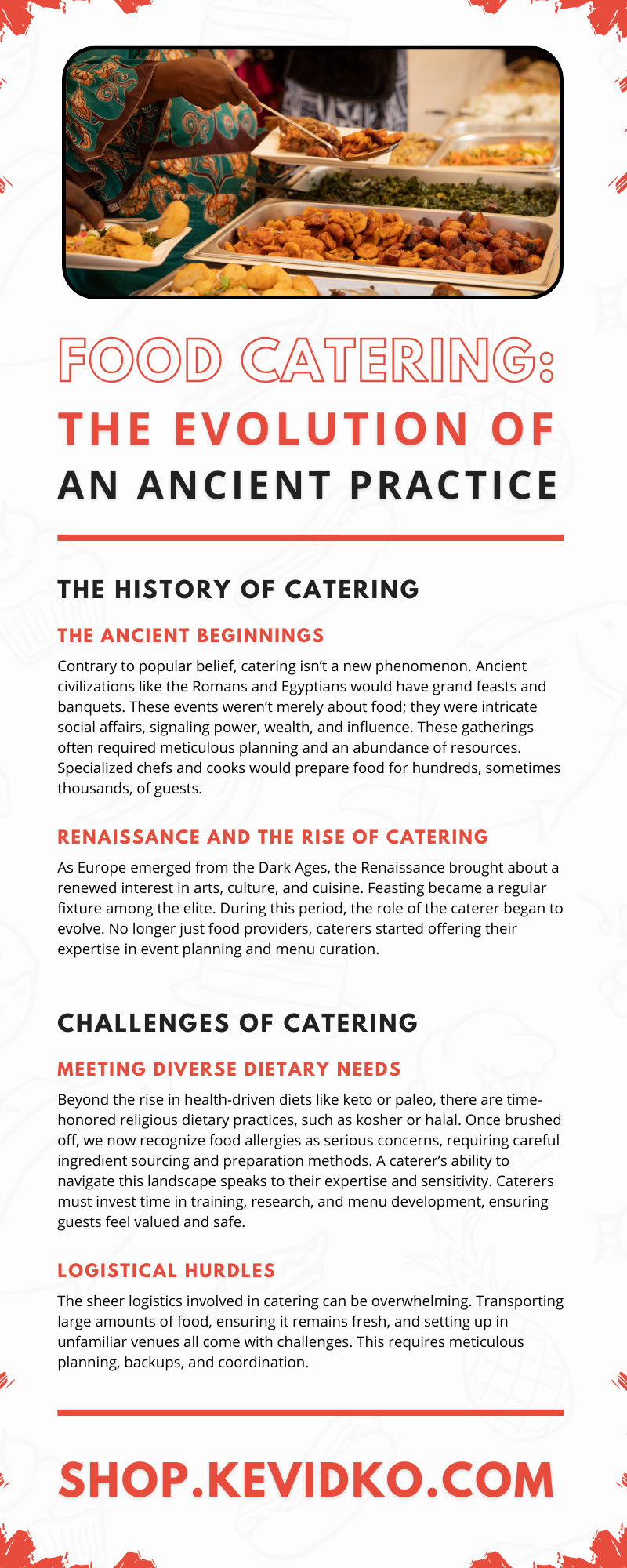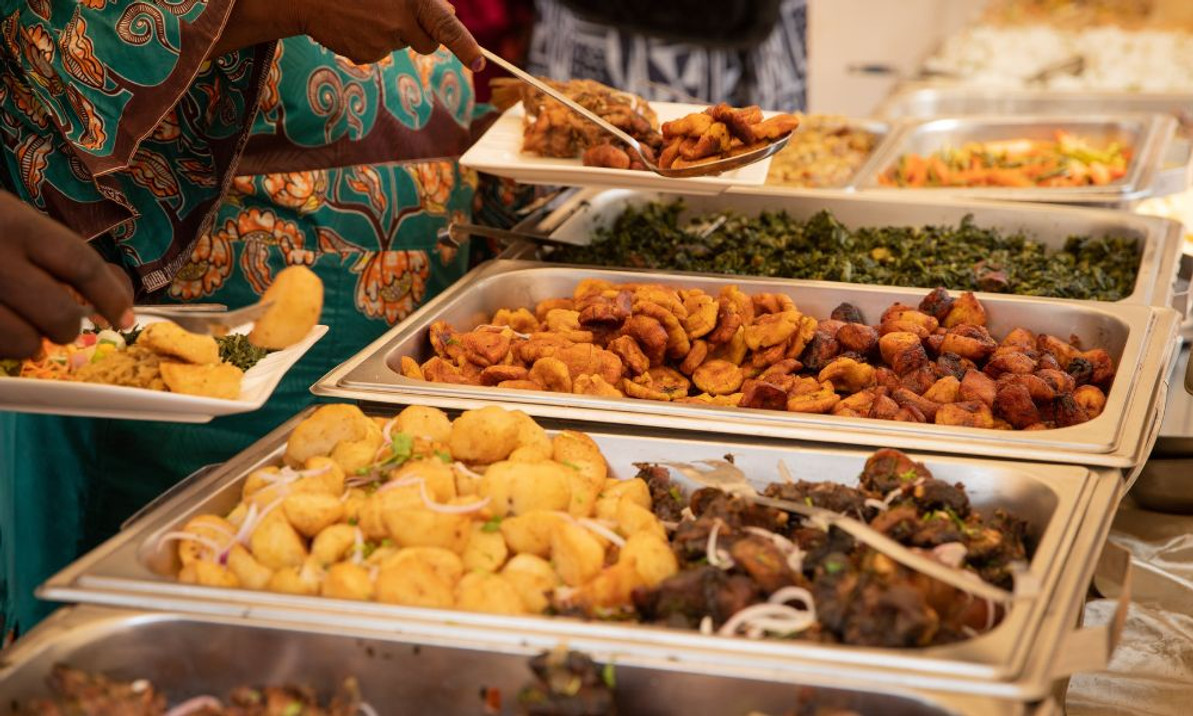Food Catering: The Evolution of an Ancient Practice
Catering, a seemingly modern affair, has deep roots in the annals of history. From the lavish feasts of ancient civilizations to today’s sophisticated and tailored events, food catering has always been a significant part of human social interactions. Read on and learn about the evolution of the ancient practice of food catering.
The History of Catering
The Ancient Beginnings
Contrary to popular belief, catering isn’t a new phenomenon. Ancient civilizations like the Romans and Egyptians would have grand feasts and banquets. These events weren’t merely about food; they were intricate social affairs, signaling power, wealth, and influence. These gatherings often required meticulous planning and an abundance of resources. Specialized chefs and cooks would prepare food for hundreds, sometimes thousands, of guests.
Renaissance and the Rise of Catering
As Europe emerged from the Dark Ages, the Renaissance brought about a renewed interest in arts, culture, and cuisine. Feasting became a regular fixture among the elite. During this period, the role of the caterer began to evolve. No longer just food providers, caterers started offering their expertise in event planning and menu curation.
Modern Era and Industrialization
The 19th and 20th centuries witnessed a paradigm shift in catering. The industrial revolution, urbanization, and the rise of the middle class brought about the need for mass catering. Events like world fairs and expos required food on an unprecedented scale. Caterers now had to think about logistics, scale, and standardization, laying the foundation for the modern catering industry.
Challenges of Catering
Meeting Diverse Dietary Needs
Beyond the rise in health-driven diets like keto or paleo, there are time-honored religious dietary practices, such as kosher or halal. Once brushed off, we now recognize food allergies as serious concerns, requiring careful ingredient sourcing and preparation methods. A caterer’s ability to navigate this landscape speaks to their expertise and sensitivity. Caterers must invest time in training, research, and menu development, ensuring guests feel valued and safe.
Logistical Hurdles
The sheer logistics involved in catering can be overwhelming. Transporting large amounts of food, ensuring it remains fresh, and setting up in unfamiliar venues all come with challenges. This requires meticulous planning, backups, and coordination.
Staying Ahead of Trends
The culinary world is as susceptible to trends as fashion. Trends influence consumer expectations, from the avocado toast rage to the resurgence of fermented foods. Caterers need to be alert, constantly updating themselves with global food movements. They should also be wary of mindlessly following fads; what works in a casual setting might not be appropriate for a formal event.
Catering Tips
Know Your Audience
Every event has a soul. It could be a corporate luncheon, a wedding, or a milestone birthday party. Understanding the essence of the event is paramount. For instance, a tech startup might appreciate a modern fusion menu, while a 50th-anniversary celebration might lean toward timeless classics. The demographics of the attendees, their cultural backgrounds, and the nature of the event guide menu creation, presentation style, and even the choice of silverware.
Invest in Quality
As the saying goes, “You are what you eat.” In catering, people judge you based on what you serve. Quality isn’t just about using premium ingredients; it’s a holistic approach. From the freshness of produce to the skill of the culinary team, every detail matters. Furthermore, quality extends to service. Well-trained servers who understand the intricacies of each dish and can explain them to guests elevate the entire dining experience. Investing in quality is essential.
Flexibility Is Key
No matter how meticulous the planning is, unexpected situations arise. There might be a delay in delivering an essential ingredient. The number of attendees might suddenly spike. Or a specific dish might not be well-received. Here, a caterer’s agility comes to the fore. The ability to quickly revise plans, whip up alternative dishes, or manage unexpected guest requests distinguishes an average caterer from an exceptional one. Flexibility means seizing opportunities to impress and exceed expectations.
The Role of Technology in Catering
The digital age has transformed every industry, and catering is no exception. From automated booking systems to digital menu displays and feedback collection through apps, technology is changing the way caterers operate. In addition, the integration of artificial intelligence allows for personalized menu suggestions based on guest preferences, ensuring a unique experience for every attendee. This technological advancement elevates the dining experience to new heights.
Sustainability in Modern Catering
With an increased global focus on sustainability, caterers are now more conscious of their carbon footprint than ever before. The farm-to-table approach is gaining traction, where caterers source ingredients locally to reduce transportation emissions. Moreover, the move toward organic, pesticide-free produce is healthier and better for the environment. Many caterers are also embracing biodegradable plates, ensuring that the environmental impact post-event is minimal.
Cultural Influences and Fusion Cuisines
The world is a melting pot of cultures, and so is its cuisine. Caterers today must serve dishes from around the world with an added twist. Fusion cuisine, combining elements from different culinary traditions, is becoming a favorite at events.
Training and Skill Development
For caterers to be successful, continuous learning is crucial. Culinary arts are ever-evolving, and techniques that were relevant a decade ago might be obsolete today. Caterers should invest in workshops, courses, and certifications to stay equipped with the latest skills. From mastering molecular gastronomy to understanding wine pairings, continuous education sets the best apart from the rest.
The Rise of Catering Boxes
In recent years, catering boxes have emerged as a trend that beautifully marries convenience with elegance. These boxes, often eco-friendly, offer a portable and personal dining experience for each guest. Particularly when social distancing has become a norm, catering boxes provide a safe, individualized dining option without compromising on the quality or presentation of the meal.
The success of catering boxes lies in their ability to maintain the integrity of the food while offering a visual appeal. They reduce the need for communal serving areas, keeping the food uncontaminated and fresh. Plus, unboxing these personalized meals adds an element of surprise and delight for the attendees. As the world leans more toward individual experiences and personalized services, catering boxes stand out as the perfect solution to meet these demands while upholding the culinary art’s grandeur.
Now that you know the evolution and intricacies of food catering, it’s clear that this ancient practice has grown into a complex and dynamic industry. From understanding the rich history of catering to navigating modern challenges and mastering the latest trends, the catering journey is as diverse as the cuisines it encompasses.

Recent Posts
-
How Take-Out Containers Can Help Reduce Food Waste
Now more than ever, people want to protect the environment and divert items from landfills. Although …Jun 23rd 2025 -
Best Take-Out Containers for Hot and Cold Food Items
When a customer picks up a take-out order at a restaurant or takes the rest of their unfinished meal …Jun 6th 2025 -
Choosing the Right Size PET Plastic Cups for Your Business
When guests come into your restaurant or coffee shop, they often order drinks that they will want to …Jun 6th 2025




